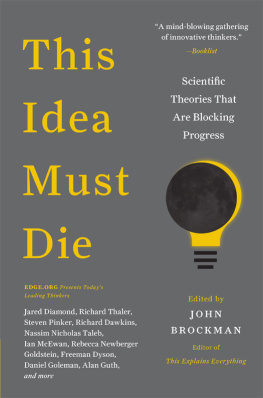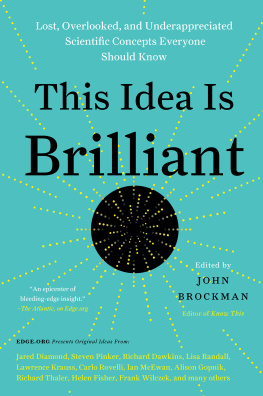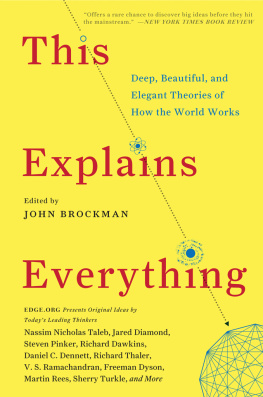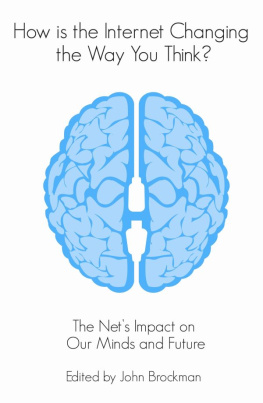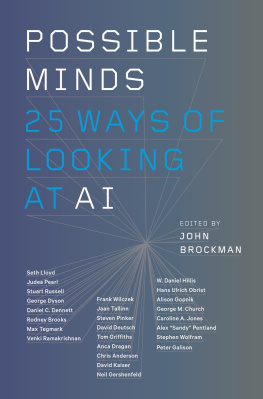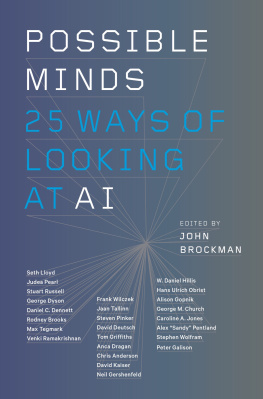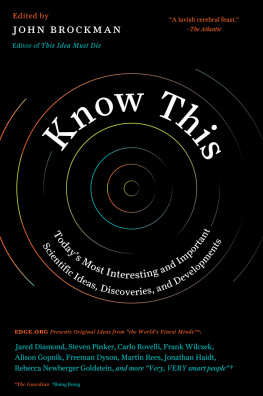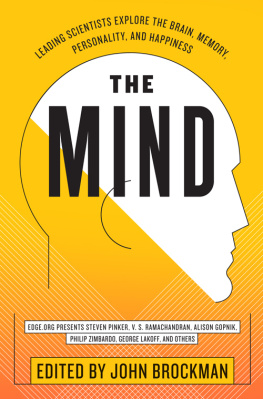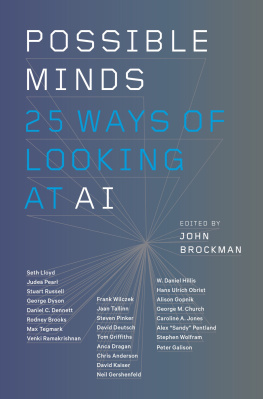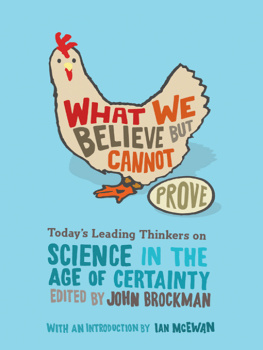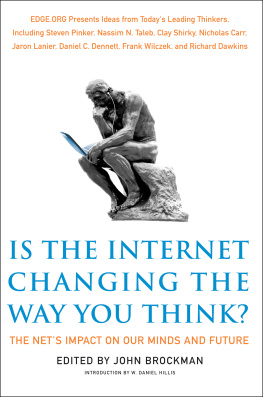Brockman - Curious minds: how a child becomes a scientist
Here you can read online Brockman - Curious minds: how a child becomes a scientist full text of the book (entire story) in english for free. Download pdf and epub, get meaning, cover and reviews about this ebook. City: New York, year: 2004, publisher: Knopf Doubleday Publishing Group;Pantheon Books, genre: Non-fiction. Description of the work, (preface) as well as reviews are available. Best literature library LitArk.com created for fans of good reading and offers a wide selection of genres:
Romance novel
Science fiction
Adventure
Detective
Science
History
Home and family
Prose
Art
Politics
Computer
Non-fiction
Religion
Business
Children
Humor
Choose a favorite category and find really read worthwhile books. Enjoy immersion in the world of imagination, feel the emotions of the characters or learn something new for yourself, make an fascinating discovery.

- Book:Curious minds: how a child becomes a scientist
- Author:
- Publisher:Knopf Doubleday Publishing Group;Pantheon Books
- Genre:
- Year:2004
- City:New York
- Rating:3 / 5
- Favourites:Add to favourites
- Your mark:
- 60
- 1
- 2
- 3
- 4
- 5
Curious minds: how a child becomes a scientist: summary, description and annotation
We offer to read an annotation, description, summary or preface (depends on what the author of the book "Curious minds: how a child becomes a scientist" wrote himself). If you haven't found the necessary information about the book — write in the comments, we will try to find it.
Curious minds: how a child becomes a scientist — read online for free the complete book (whole text) full work
Below is the text of the book, divided by pages. System saving the place of the last page read, allows you to conveniently read the book "Curious minds: how a child becomes a scientist" online for free, without having to search again every time where you left off. Put a bookmark, and you can go to the page where you finished reading at any time.
Font size:
Interval:
Bookmark:
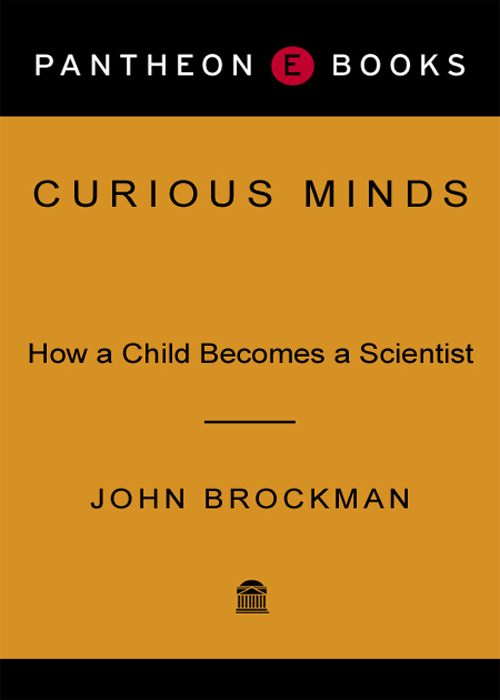
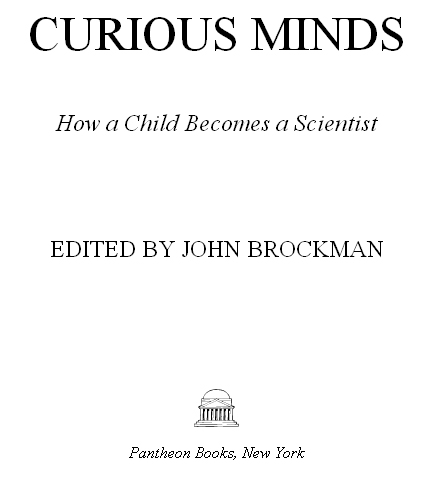
Contents
NICHOLAS HUMPHREY
DAVID M. BUSS
ROBERT M. SAPOLSKY
MIHALY CSIKSZENTMIHALYI
MURRAY GELL-MANN
ALISON GOPNIK
PAUL C. W. DAVIES
FREEMAN J. DYSON
LEE SMOLIN
STEVEN PINKER
MARY CATHERINE BATESON
LYNN MARGULIS
JARON LANIER
RICHARD DAWKINS
HOWARD GARDNER
JOSEPH LEDOUX
SHERRY TURKLE
MARC D. HAUSER
RAY KURZWEIL
JANNA LEVIN
RODNEY BROOKS
J. DOYNE FARMER
STEVEN STROGATZ
TIM WHITE
V. S. RAMACHANDRAN
DANIEL C. DENNETT
JUDITH RICH HARRIS
Acknowledgments
I first began thinking about this book when, in Santa Fe on Christmas Day 2002, I spent much of the afternoon in a long, rambling conversation with Murray Gell-Mann, discussing his childhood.
The theme of How a Child Becomes a Scientist came out of a conversation between Marc Hauser and Dan Dennett at a dinner in Cambridge, Massachusetts, several months later.
I wish to thank my U.S. publisher, Marty Asher, of Pantheon Books, and my U.K. publisher, Will Sulkin, of Jonathan Cape, for their encouragement.
I am also indebted to my agent, Max Brockman, who recognized the potential for this book, and to Sara Lippincott for her thoughtful and meticulous editing.
Introduction
JOHN BROCKMAN
In the spring of 2003, I attended a talk given by the mathematician Douglas Hofstadter and sponsored by Daniel C. Dennetts Center for Cognitive Studies at Tufts University. Later I gave a dinner in Cambridge whose guests included Hofstadter, Dennett, and the Harvard psychologist Marc Hauser, among other scientists. The wide-ranging and animated conversation that evening covered such topics as intuition, evolutionary biology, artificial intelligence, cognitive and neuroscience, music perception, and more. I recall thinking that dinner-table conversation doesnt get any better than this.
At one point, Marc Hauser turned to Dan Dennett and asked, Can you remember when you got started thinking about these issues? How old were you? When did you get passionate about ideas? Dan replied that when he was six an adult told him that since he was asking such interesting questions, he should become a philosopher. Doug Hofstadter said that from the first moment he could remember, he loved numbers and knew he wanted to do mathematics. For Marc, it wasnt until college that he discovered his specific interests. But what they all shared as children was curiosity and a deep passion for learning, whether specific or general. As one of the other dinner guests mused, It all started when we were kids.
How a Child Becomes a Scientist: Twenty-seven Scientists Describe What Inspired Them to Choose Their Paths contains twenty-seven essays, contributed by some of the worlds foremost third-culture scientistspublic intellectuals who, in their writing, bridge the once formidable gap between science and the humanities. Their essays, from the mind and from the heart, are personal and accessible. No scientific background required!
As a starting point for the essays, I asked the contributors, What happened when you were a kid that led you to pursue a life in science? What got you interested in your current field of research and inspired you to become the person you are? Who were your parents, your peers, your mentors? What were your turning points, your segues, your influences, your epiphanies, your accidents, pressures, conflicts, mistakes?
My goal was to provide readers with insight into the early lives of some of the most interesting thinkers on the planet. And to motivate and inspire.
These essays convey a sense of the excitement that the authors evidently feel about the stated goals of the book. I must also note that that this group of scientistsa particularly unruly bunch in some casesdid not slavishly adhere to my mandate. Some of the contributors sail through their early childhoods and pick up their narratives in college and graduate school. But they are all worth knowing and listening to, and this book is a good place to begin.
The themes in the book are not predictable. Prepare to be surprised.
Richard Dawkins writes about the influence of reading Dr. Dolittle. David Buss learns about certain facts of life while working at a New Jersey truck stop. Janna Levin, in love with the cosmos, fantasizes about traveling to the edge of the universe. Nicholas Humphrey muses about the privileges that go with being born into a dynasty of scientists. Robert Sapolsky haunts the Bronx Zoo and wants to be a mountain gorilla. Steven Pinker turns the thesis of the book on its head. Rather than childhood experiences causing us to be who we are, who we are causes our childhood experiences, he writes. Judith Rich Harris recounts her isolation, loneliness, and differentiation from others in her peer group.
Several contributors grew up surrounded by nature: Tim White writes about life in rural Southern California, and Murray Gell-Mann, as a child, regards New York City as a hemlock forest that had been overlogged.
Daniel Dennett, Steven Strogatz, Marc Hauser, and Doyne Farmer talk about the teachers and mentors who changed their lives forever.
Paul Davies and Lee Smolin recall their early encounters with members of the opposite sex.
The power and influence of books and the ideas associated with them is a theme of the essays by Alison Gopnik, Mihaly Csikszentmihalyi, Howard Gardner, and Sherry Turkle.
Mary Catherine Bateson, Freeman Dyson, and V. S. Ramachandran write about important parental influences.
Ideas and experiments informed the early lives of Lynn Margulis, Joseph LeDoux, Rodney Brooks, Jaron Lanier, and Ray Kurzweil.
Recently, I spent an afternoon in Santa Fe talking with Murray Gell-Mann, particle physicist, extraordinary polymath, and Nobel laureate. I have had long, rambling conversations with Murray over the past decade, mostly about scientific issues, ranging from quarks to complex adaptive systems. This time I was curious to learn about his childhoodabout how he became interested in physics in the first place and about the evolution of his long and brilliant career. During our conversation, he told me a story.
In 1951, at the age of twenty-one, Murray was a postdoc at the Institute for Advanced Study in Princeton, where he often encountered Albert Einstein as both were on their way to work. Albert Einstein was my fathers hero, Murray said, and I could have spoken to him, but at that time I didnt like the kind of people who introduced themselves and tried to strike up acquaintances with great figures. Murray happened to be in disagreement with Einsteins attempts to seek a unified field theory without incorporating quantum mechanics or the strong and weak nuclear forces. If he had been working on something that looked promising, Murray said, I would have felt that I had a legitimate reason to talk with him, but this wasnt the case.... And now, Murray told me, he was full of regrets that he had not simply asked the elderly Einstein about his thinking back in the early years of the twentieth century, when he was carrying out the greatest physics research since Newtons. That would have been exciting!
Perhaps as much as anyone else in todays culture, I find myself in an analogous privileged position: that of being able to talk with the worlds leading scientistsand to cajole them into writing essays about their own early lives and the history of their own attitudes toward the world and toward what would become their lifes work. Unlike Murray, who failed to engage Einstein in conversation in 1951, I have no intentions of letting this magnificent opportunity slip by!
Next pageFont size:
Interval:
Bookmark:
Similar books «Curious minds: how a child becomes a scientist»
Look at similar books to Curious minds: how a child becomes a scientist. We have selected literature similar in name and meaning in the hope of providing readers with more options to find new, interesting, not yet read works.
Discussion, reviews of the book Curious minds: how a child becomes a scientist and just readers' own opinions. Leave your comments, write what you think about the work, its meaning or the main characters. Specify what exactly you liked and what you didn't like, and why you think so.

